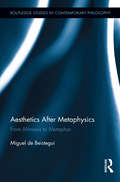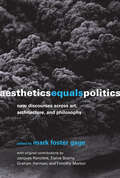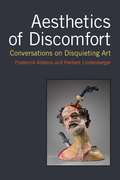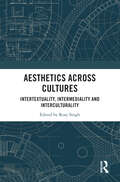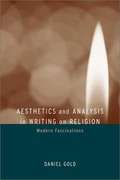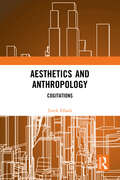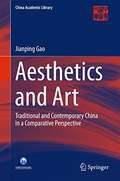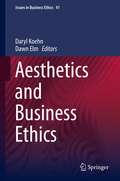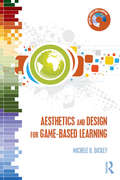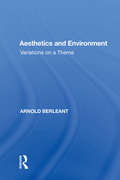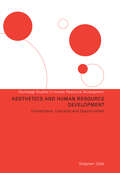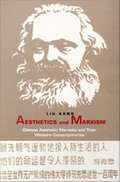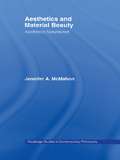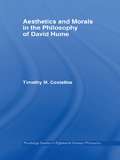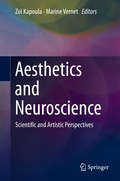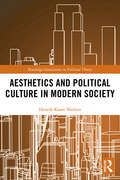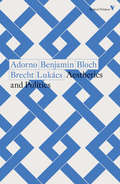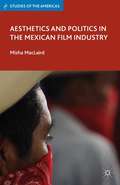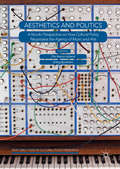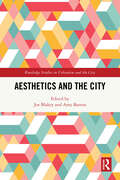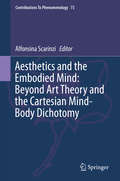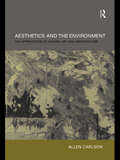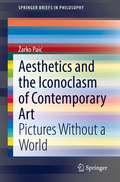- Table View
- List View
Aesthetics
by Michael GandyThe attempt to put a big box store in the middle of an upscale development turns the town of Millicent, Mississippi, on its head, with opponents on both sides of the issue turning deadly.
Aesthetics After Metaphysics: From Mimesis to Metaphor (Routledge Studies in Contemporary Philosophy)
by Miguel BeisteguiThis book focuses on a dimension of art which the philosophical tradition (from Plato to Hegel and even Adorno) has consistently overlooked, such was its commitment – explicit or implicit – to mimesis and the metaphysics of truth it presupposes. De Beistegui refers to this dimension, which unfolds outside the space that stretches between the sensible and the supersensible – the space of metaphysics itself – as the hypersensible and show how the operation of art to which it corresponds is best described as metaphorical. The movement of the book, then, is from the classical or metaphysical aesthetics of mimesis (Part One) to the aesthetics of the hypersensible and metaphor (Part Two). Against much of the history of aesthetics and the metaphysical discourse on art, he argues that the philosophical value of art doesn’t consist in its ability to bridge the space between the sensible and the supersensible, or the image and the Idea, and reveal the sensible as proto-conceptual, but to open up a different sense of the sensible. His aim, then, is to shift the place and role that philosophy attributes to art.
Aesthetics Equals Politics: New Discourses across Art, Architecture, and Philosophy (The\mit Press Ser.)
by Mark Foster Gage Matt ShawHow aesthetics—understood as a more encompassing framework for human activity—might become the primary discourse for political and social engagement.These essays make the case for a reignited understanding of aesthetics—one that casts aesthetics not as illusory, subjective, or superficial, but as a more encompassing framework for human activity. Such an aesthetics, the contributors suggest, could become the primary discourse for political and social engagement. Departing from the “critical” stance of twentieth-century artists and theorists who embraced a counter-aesthetic framework for political engagement, this book documents how a broader understanding of aesthetics can offer insights into our relationships not only with objects, spaces, environments, and ecologies, but also with each other and the political structures in which we are all enmeshed. The contributors—philosophers, media theorists, artists, curators, writers and architects including such notable figures as Jacques Rancière, Graham Harman, and Elaine Scarry—build a compelling framework for a new aesthetic discourse. The book opens with a conversation in which Rancière tells the volume's editor, Mark Foster Gage, that the aesthetic is “about the experience of a common world.” The essays following discuss such topics as the perception of reality; abstraction in ethics, epistemology, and aesthetics as the “first philosophy”; Afrofuturism; Xenofeminism; philosophical realism; the productive force of alienation; and the unbearable lightness of current creative discourse.Contributors Mark Foster Gage, Jacques Rancière, Elaine Scarry, Graham Harman, Timothy Morton, Ferda Kolatan, Adam Fure, Michael Young, Nettrice R. Gaskins, Roger Rothman, Diann Bauer, Matt Shaw, Albena Yaneva, Brett Mommersteeg, Lydia Kallipoliti, Ariane Lourie Harrison, Rhett Russo, Peggy Deamer, Caroline PicardMatt Shaw, Managing Editor
Aesthetics Of Discomfort: Conversations On Disquieting Art
by Frederick Luis Aldama Herbert S. LindenbergerThrough a series of provocative conversations, Frederick Luis Aldama and Herbert Lindenberger-who have written widely on literature, film, music, and art-locate a place for the discomforting and the often painfully unpleasant within aesthetics. The conversational format allows them to travel informally across many centuries and many art forms. They have much to tell one another about the arts since the advent of modernism soon after 1900-the nontonal music, for example, of the Second Vienna School, the chance-directed music and dance of John Cage and Merce Cunningham, the in-your-faceness of such diverse visual artists as Francis Bacon, Pablo Picasso, Willem de Kooning, Egon Schiele, Otto Dix, and Damien Hirst. They demonstrate as well a long tradition of discomforting art stretching back many centuries, for example, in the Last Judgments of innumerable Renaissance painters, in Goya's so-called "black" paintings, in Wagner's Tristan chord, and in the subtexts of Shakespearean works such as King Lear and Othello. This book is addressed at once to scholars of literature, art history, musicology, and cinema. Although its conversational format eschews the standard conventions of scholarly argument, it provides original insights both into particular art forms and into individual works within these forms. Among other matters, it demonstrates how recent work in neuroscience may provide insights in the ways that consumers process difficult and discomforting works of art. The book also contributes to current aesthetic theory by charting the dialogue that goes on-especially in aesthetically challenging works-between creator, artifact, and consumer. Book jacket.
Aesthetics across Cultures: Intertextuality, Intermediality and Interculturality
by Rosy SinghThis book critically examines the "mutual illuminations" between literature, religion, architecture, films, performative arts, paintings, woodworks, memes and masks cutting across time and space. Architecture is a good example where the eventual success of a project depends on the harmony between physical sciences and aesthetics, design and planning, knowledge of building material, the local climate and awareness of cultural sensibilities. This volume affirms that aesthetics and arts are deeply linked through existential issues of who I am. The chapters in this volume present diverse discursive structures highlighting the in-between spaces between various art forms and mediums, such as: • Architecture, literature and memory • Kafka in SoHo; Kafka and Bernhard • Kirchner’s woodcuts; pictorial and stage representations of E.T.A. Hoffmann • Hesse’s fairy tales; translations of Pañcatantra • Nietzsche, ritual arts and face masks; martyrdom in La chanson de Roland • Goethe and Hafiz; Indian thought in Martin Buber • Rhythms of the "Third" across cultures • Dadaism and contemporary memes This book examines these sublime linkages in a comparative and interdisciplinary way. Engaging and intersectional, this volume will appeal to students and scholars of arts and aesthetics, literature, philosophy, architecture, sociology, translation studies and readers who are interested in cultural, intertextual, intermedial and comparative studies.
Aesthetics and Analysis in Writing on Religion: Modern Fascinations
by Daniel GoldThis is a book that looks at contemporary challenges to studying and writing in religion, rethinking the discipline in a way that takes seriously both the aesthetic dimensions and its need for scientific discipline. Gold pursues a new line of thought about the art of religion, arguing for something he calls interpretive writing.
Aesthetics and Anthropology: Cogitations
by Tarek ElhaikThis book focuses on the reconfiguration of aesthetic anthropology into an anthropological problem of cogitation, opening up a fascinating new dialogue between the domains of anthropology, philosophy, and art. Tarek Elhaik embarks on an inquiry composed of a series of cogitations based on fieldwork in an ecology of artistic and scientific practices: from conceptual art exhibitions to architectural environments; from photographic montages to the videotaping of spirit seances; from artistic interventions in natural history museums to ongoing dialogues between performance artists and marine scientists. The chapters examine the image-work, ethical demands, and aesthetic struggles of interlocutors including artists Mathias Goeritz, Mounir Fatmi, Silvia Gruner, Joan Jonas, and Patricia Lagarde.
Aesthetics and Art: Traditional And Contemporary China In A Comparative Perspective (China Academic Library)
by Jianping GaoPresents aesthetic thoughts in traditional and contemporary China.<P><P>Compares the similarities and differences between traditional and modern Chinese aesthetics.<P>Explores the aesthetic implications of traditional Chinese paintings.<P>This book introduces traditional and modern aesthetics and arts, comparing the similarities and differences between traditional and modern Chinese aesthetics. It also explores the aesthetic implications of traditional Chinese paintings, and discusses the development of aesthetics throughout history, as well as the changes and improvements in Chinese aesthetics in the context of globalization.
Aesthetics and Business Ethics (Issues in Business Ethics #41)
by Daryl Koehn Dawn ElmLudwig Wittgenstein famously said, "Ethics is aesthetics." It is unclear what such a claim might mean and whether it is true. This book explores contentious issues arising at the interface of ethics and aesthetics. The contributions reflect on the status of aesthetic en ethical judgments, the relation of aesthetic beauty and ethical goodness and art and character development. The book further considers the potential role art could play in ethical analysis and in the classroom and explores in what respects aesthetics and ethics might be intertwined and even mutually supportive.
Aesthetics and Design for Game-based Learning (Digital Games, Simulations, and Learning)
by Michele D. DickeyAesthetics and Design for Game-based Learning provides learning designers with insight into how the different elements that comprise game aesthetics can inform the design of game-based learning. Regardless of the cognitive complexities involved, games are essentially entertainment media, and aesthetics play a large role in how they are experienced. Yet too often the role of aesthetics in the research about game-based learning has been relegated to a surface discussion of graphics or neglected altogether. Aesthetics and Design for Game-based Learning begins by addressing the broad context of game aesthetics, then addresses specific elements with chapters focusing on: player positioning game mechanics narrative design environment design character design. Each chapter includes research and guidelines for design, and a conclusion addresses aesthetics in the research of game-based learning.
Aesthetics and Environment: Variations on a Theme
by Arnold BerleantThe essays collected in Aesthetics and Environment comprise a set of variations on art and culture guided by the theme of environment. The essays deal with the physical reality of environment such as the city, the shore, the water and the garden, but also with the virtual environment and the social one. Environmental aesthetics is a theme whose variations are as endless as the possibilities of the human performers and conditions from which it is fashioned. This enticing set of essays testifies to Berleant's special talent in moving easily between both natural and human environments and opens out the contemporary discussion beyond that of the wilderness to the cultural and social environment. Berleant argues that neither the natural nor human environment stands alone and both are best understood as distinctions that are in experience coextensive, that one can only speak of environment in relation to human experience. The theme of this book is that such experience suffuses the so-called natural world and shapes the human world. It maintains the idea that in as much as people are embedded in these worlds, relationships, including human relationships, are part of them. The melding of these two worlds leads Berleant to defend ultimately what he has termed 'social aesthetics' .
Aesthetics and Human Resource Development: Connections, Concepts and Opportunities (Routledge Studies in Human Resource Development #Vol. 13)
by Stephen GibbThe first book to look at both aesthetics and human resource development, this timely and original work investigates existing, as well as possible future, connections and relations between the two areas. Well structured and expertly written, The Aesthetic Challenges of Human Resource Development is undoubtedly a valuable reference for students of human resource management, business and management, and aesthetics.
Aesthetics and Marxism: Chinese Aesthetic Marxists and Their Western Contemporaries
by Liu KangAlthough Chinese Marxism--primarily represented by Maoism--is generally seen by Western intellectuals as monolithic, Liu Kang argues that its practices and projects are as diverse as those in Western Marxism, particularly in the area of aesthetics. In this comparative study of European and Chinese Marxist traditions, Liu reveals the extent to which Chinese Marxists incorporate ideas about aesthetics and culture in their theories and practices. In doing so, he constructs a wholly new understanding of Chinese Marxism. Far from being secondary considerations in Chinese Marxism, aesthetics and culture are in fact principal concerns. In this respect, such Marxists are similar to their Western counterparts, although Europeans have had little understanding of the Chinese experience. Liu traces the genealogy of aesthetic discourse in both modern China and the West since the era of classical German thought, showing where conceptual modifications and divergences have occurred in the two traditions. He examines the work of Mao Zedong, Lu Xun, Li Zehou, Qu Qiubai, and others in China, and from the West he discusses Kant, Schiller, Schopenhauer, and Marxist theorists including Horkheimer, Adorno, Benjamin, and Marcuse. While stressing the diversity of Marxist positions within China as well as in the West, Liu explains how ideas of culture and aesthetics have offered a constructive vision for a postrevolutionary society and have affected a wide field of issues involving the problems of modernity. Forcefully argued and theoretically sophisticated, this book will appeal to students and scholars of contemporary Marxism, cultural studies, aesthetics, and modern Chinese culture, politics, and ideology.
Aesthetics and Material Beauty: Aesthetics Naturalized (Routledge Studies in Contemporary Philosophy)
by Jennifer A. McMahonIn Aesthetics and Material Beauty, Jennifer A. McMahon develops a new aesthetic theory she terms Critical Aesthetic Realism - taking Kantian aesthetics as a starting point and drawing upon contemporary theories of mind from philosophy, psychology, and cognitive science. The creative process does not proceed by a set of rules. Yet the fact that its objects can be understood or appreciated by others suggests that the creative process is constrained by principles to which others have access. According to her update of Kantian aesthetics, beauty is grounded in indeterminate yet systematic principles of perception and cognition. However, Kant’s aesthetic theory rested on a notion of indeterminacy whose consequences for understanding the nature of art were implausible. McMahon conceptualizes "indeterminacy" in terms of contemporary philosophical, psychological, and computational theories of mind. In doing so, she develops an aesthetic theory that reconciles the apparent dichotomies which stem from the tension between the determinacy of communication and the indeterminacy of creativity. Dichotomies such as universality and subjectivity, objectivity and autonomy, cognitivism and non-cognitivism, and truth and beauty are revealed as complementary features of an aesthetic judgment.
Aesthetics and Morals in the Philosophy of David Hume (Routledge Studies in Eighteenth-Century Philosophy)
by Timothy M CostelloeThe book has two aims. First, to examine the extent and significance of the connection between Hume's aesthetics and his moral philosophy; and, second, to consider how, in light of the connection, his moral philosophy answers central questions in ethics. The first aim is realized in chapters 1-4. Chapter 1 examines Hume's essay "Of the Standard of Taste" to understand his search for a "standard" and how this affects the scope of his aesthetics. Chapter 2 establishes that he treats beauty in nature and art and moral beauty as similar in kind, and applies the conclusions about his aesthetics to his moral thought. Chapter 3 solves a puzzle to which this gives rise, namely, how individuals both accept general standards that they also contravene in the course of aesthetic and moral activity. Chapter 4 takes up the normative aspect of Hume's approach by understanding moral character through his view of moral beauty. The second aim of the book is realized in chapters 5-7 by entertaining three objections against Hume's moral philosophy. First, if morality is an immediate reaction to the beauty of vice and the deformity of virtue, why is perfect virtue not the general condition of every human individual? Second, if morality consists of sentiments that arise in the subject, how can moral judgments be objective and claim universal validity? And third, if one can talk of "general standards" governing conduct, how does one account for the diversity of moral systems and their change over time? The first is answered by showing that like good taste in aesthetics, 'right taste' in morals requires that the sentiments are educated; the second, by arguing against the view that Hume is a subjectivist and a relativist, and the third (chapter 6), by showing that his approach contains a view of progress left untouched by any personal prejudices Hume himself might harbor. The book concludes in chapter 7 by showing how Hume's view of philosophy affects the scope of any normative ethics.
Aesthetics and Neuroscience: Scientific and Artistic Perspectives
by Zoï Kapoula Marine VernetThis edited monograph provides a compelling analysis of the interplay between neuroscience and aesthetics. The book broaches a wide spectrum of topics including, but not limited to, mathematics and creator algorithms, neurosciences of artistic creativity, paintings and dynamical systems as well as computational research for architecture. The international authorship is genuinely interdisciplinary and the target audience primarily comprises readers interested in transdisciplinary research between neuroscience and the broad field of aesthetics.
Aesthetics and Political Culture in Modern Society (Routledge Innovations in Political Theory)
by Henrik Kaare NielsenDo aesthetic appeals to senses and emotions in political debate necessarily marginalise political reason and reduce citizens to consumers – thus dangerously undermining democracy? Or is sensuous-emotional engagement, on the contrary, a basic fact of the political process and a crucial precondition for revitalising democracy? Aesthetics and Political Culture in Modern Society investigates the current interrelationship between aesthetic practice and political practice in Western democracies, focusing on its impact on democratic political culture. Henrik Kaare Nielsen argues that aesthetic interventions in the political process do not by definition undermine politics’ content of reason. Instead, a differentiation must be made between a multiplicity of aesthetic forms of intervention – some of which tend to weaken the political judgement of citizens while other forms tend to stimulate competent judgement. This book will be of interest to scholars in the fields of political science, sociology, media studies, and cultural studies.
Aesthetics and Politics (Radical Thinkers)
by Walter Benjamin Theodor Adorno Georg Lukacs Bertolt Brecht Ernst BlochNo other country and no other period has produced a tradition of major aesthetic debate to compare with that which unfolded in German culture from the 1930s to the 1950s. In Aesthetics and Politics the key texts of the great Marxist controversies over literature and art during these years are assembled in a single volume. They do not form a disparate collection but a continuous, interlinked debate between thinkers who have become giants of twentieth-century intellectual history.
Aesthetics and Politics in the Mexican Film Industry
by Misha MaclairdAesthetics and Politics in the Mexican Film Industry is the first English-language analysis of what some called a "renaissance" at the turn of the twenty-first century. It examines the years surrounding Mexicos presidential elections in 2000 and the fall of the ruling party after seventy one years in power in order to better understand a moment when politics and cinema shared the limelight. Moving beyond the international blockbusters, the research evaluates a broad selection of films, produced from the early 1990s to the present, to help demystify this period for scholars and students. It explains in clear language how production methods, audience demographics, and aesthetic approaches have changed throughout the past two decades of Mexican cinema and how these changes relate to Mexico's transitions to a democratic political system and free-market economy. "
Aesthetics and Politics: A Nordic Perspective on How Cultural Policy Negotiates the Agency of Music and Arts (New Directions in Cultural Policy Research)
by Ole Marius Hylland Erling BjurströmThrough comparative and integrated case studies, this book demonstrates how aesthetics becomes politics in cultural policy. Contributors from Norway, Sweden and the UK analyse exactly what happens when art is considered relevant for societal development, at both a practical and theoretical level. Cultural policy is seen here as a mechanism for translating values, that through organized and practical aesthetical judgement lend different forms of agency to the arts. What happens when aesthetical value is reinterpreted as political value? What kinds of negotiations take place at a cultural policy ground level when values are translated and reinterpreted? By addressing these questions, the editors present an original collection that effectively centralises and investigates the role of aesthetics in cultural policy research.
Aesthetics and Technology in Building: The Twenty-First-Century Edition
by Thomas Leslie Pier Nervi Cristiana Chiorino Elisabetta NerviThe UNESCO headquarters in Paris. The Pirelli skyscraper in Milan. The Palazetto dello Sport in Rome. The "soaring beauty" of Pier Luigi Nervi's visionary designs and buildings changed cityscapes in the twentieth century. His uncanny ingenuity with reinforced concrete, combined with a gift for practical problem solving, revolutionized the use of open internal space in structures like arenas and concert halls. Aesthetics and Technology in Building: The Twenty-First-Century Edition introduces Nervi's ideas about architecture and engineering to a new generation of students and admirers. More than 200 photographs, details, drawings, and plans show how Nervi put his ideas into practice. Expanding on the seminal 1961 Norton Lectures at Harvard, Nervi analyzes various functional and construction problems. He also explains how precast and cast-in-place concrete can answer demands for economy, technical and functional soundness, and aesthetic perfection. Throughout, he uses his major projects to show how these now-iconic buildings emerged from structural truths and far-sighted construction processes. This new edition features dozens of added images, a new introduction, and essays by Joseph Abram, Robert Einaudi, Alberto Bologna, and Gabriele Neri on Nervi's life, work, and legacy.
Aesthetics and the City (Routledge Studies in Urbanism and the City)
by Joe Blakey Amy BarronAesthetics and the City engages aesthetics to explore the role of the city in urban experience. Drawing on diverse theories and global case studies, this edited collection examines how aesthetics relates to how cities and urban spaces are perceived, organised, and transformed.This book celebrates and ponders the wide diversity of aesthetic approaches within urban studies, noting that the way aesthetics is understood impacts what can be understood about cities and the urban order more generally. In its most general sense, aesthetics refers to our sensuous relation to the world. It invariably figures in how we make sense of the city and ourselves—bound to how urban life is experienced imaginatively, materially, socially, culturally, and politically. In an era where scholars have expressed concern at epistemological city-centrism, aesthetics is proposed as a versatile concept through which the centrality of the city to urban thought can be assessed. The book also explores how aesthetics intersects with a range of tangential concepts including power, the political, art, and affect. Ultimately it makes the case that this diverse ensemble of approaches to aesthetics can enable scholars to understand the city and its enduring relevance to urban thought.This book focuses on the concepts of "aesthetics" and "the city" and will appeal to scholars and students in urban studies, human geography, planning, politics, and sociology.
Aesthetics and the Embodied Mind: Beyond Art Theory and the Cartesian Mind-Body Dichotomy (Contributions To Phenomenology #73)
by Alfonsina ScarinziThe project of naturalizing human consciousness/experience has made great technical strides (e. g. , in mapping areas of brain activity), but has been hampered in many cases by its uncritical reliance on a dualistic "Cartesian" paradigm (though as some of the authors in the collection point out, assumptions drawn from Plato and from Kant also play a role). The present volume proposes a version of naturalism in aesthetics drawn from American pragmatism (above all from Dewey, but also from James and Peirce)--one primed from the start to see human beings not only as embodied, but as inseparable from the environment they interact with--and provides a forum for authors from diverse disciplines to address specific scientific and philosophical issues within the anti-dualistic framework considering aesthetic experience as a process of embodied meaning-making. Cross-disciplinary contributions come from leading researchers including Mark Johnson, Jim Garrison, Daniel D. Hutto, John T. Haworth, Luca F. Ticini, Beatriz Calvo-Merino. The volume covers pragmatist aesthetics, neuroaesthetics, enactive cognitive science, literary studies, psychology of aesthetics, art and design, sociology.
Aesthetics and the Environment: The Appreciation of Nature, Art and Architecture
by Allen CarlsonTraditional aesthetics is often associated with the appreciation of art, Allen Carlson shows how much of our aesthetic experience does not encompass art but nature, in our response to sunsets, mountains or horizons or more mundane surroundings, like gardens or the view from our window.He argues that knowledge of what it is we are appreciating is essential to having an appropriate aesthetic experience and that scientific understanding of nature can enhance our appreciation of it, rather than denigrate it.
Aesthetics and the Iconoclasm of Contemporary Art: Pictures Without a World (SpringerBriefs in Philosophy)
by Žarko PaićThe main themes and aims of this book are understanding aesthetics, contemporary art and the end of the avant-garde not from the traditional viewpoint of the metaphysics of the beautiful and the sublime but rather thru close connection to the techno-genesis of virtual worlds. This book tackles problems in contemporary art theory such as the body in space and time of digital technologies, along with other issues in visual studies and image science. Further intentions exhibit the fundamental reasons for the disappearance of the picture in the era of virtual reality starting from the notion of contemporary art as realized iconoclasm; art has no world for its "image". The author argues that the iconoclasm of contemporary art has severe consequences. This text appeals to philosophers of art and those interested in contemporary art theory.

